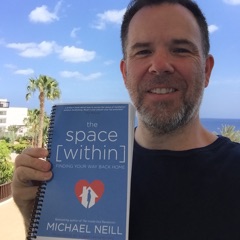JST 121 – Your true identity
“…if you’re searching for happiness… If you’re searching for tranquility…
if you’re searching just to have a nice… peaceful… loving…
understanding life… in actual fact… your searching for your inner self…”
Sydney Banks
For many years, I was a “seeker”, hooked on the morphine of self-improvement and running on the “I’ll be happy when…” hamster wheel. In 2008, I was at the end of my tether, and hired Michael Neill to coach me. To my shock and surprise, I discovered that Michael was in the process of transitioning to using Sydney Banks’ articulation of the principles behind psychology as the basis for his coaching. I’d explored and rejected Banks’ work many years earlier, and was dubious about its value. Nevertheless, I was committed to working with Michael, and did my best to approach it with an open mind. At first, I put up quite a struggle and argued a lot. But from time to time, something strange would happen; my mind would go quiet, and I would fall into a deeper space of clarity, connection and insight. I intuitively sensed there was something here to explore, and started exploring more enthusiastically. Then, in June 2009, I had a big realisation: “These principles are to psychology what the discovery of germs was to medicine.” This insight led to me walking away from the field of NLP, selling my business and heading in an entirely new direction (a direction I’ll always be profoundly grateful to Michael for pointing me in). In this article, I’m going to share an excerpt from Michael’s excellent new book, The Space Within: Finding Your Way Back Home (©2016 Michael Neill). As part of the launch this week, Michael’s giving away lots of great stuff. You can find out more here: https://www.michaelneill.org/spacewithin. Here’s the excerpt:
A CASE OF MISTAKEN IDENTITY
Imagine that Bill Gates comes to you for business coaching. At first you’re puzzled, because it would seem that Bill Gates doesn’t really need business coaching, but then you realize that he has amnesia and has no idea who he is.
Here’s the question:
Do you use your sessions to try to give him business advice,
or do you spend your time together doing everything you can
to help him remember who he really is and what he’s really got going for him?
While it may (or may not) take a bit longer to work toward him remembering his true identity than to offer your personal insights into how best to handle the latest crisis (or opportunity) at Microsoft, the difference in outcome is liable to be phenomenal.
But what if you’re the one with amnesia? Are you who you think you are? Is your body merely an icon in the game of life with a name and a backstory that tells you how well or poorly your character is meant to play the game?
To view the question of who you really are in a different light, consider the question of ‘the University’ as laid out by British philosopher Gilbert Ryle in his book The Concept of Mind:
A foreigner visiting Oxford or Cambridge for the first time is shown a number of colleges, libraries, playing fields, museums, scientific departments and administrative offices. He then asks, ‘But where is the University? I have seen where the members of the Colleges live, where the Registrar works, where the scientists experiment and the rest. But I have not yet seen the University in which reside and work the members of your University.’
So where is the University really? Is it in:
A The buildings and grounds?
B The students and professors?
C The interplay between them?
D The spirit of education that infuses them all with ‘University-like’ qualities?
E All (or none) of the above?
Substitute ‘the self’ for ‘the University’ and we have the paradox at the heart of all attempts at self-improvement: where is the separate ‘self’ that we are trying to improve?
Is it in:
A Our mind and body?
B Our thoughts and emotions?
C Our behavior?
D The spirit that animates us – what Ryle called ‘the ghost in the machine’?
E All (or none) of the above?
It seems to me that there is no one ‘thing’ that can be pointed to as ‘the University,’ even though we can identify its many parts; similarly, there is no one ‘separate self’ to be improved.
Insights into the principles Sydney Banks articulated have literally transformed my life. They now form the basis of the work I do with others to transform their lives and results. If you’re a transformation professional, and you’re ready for your own transformation, then you may be a good fit for something I’m starting next month. Here’s what I’m looking for:
– You have at least one year’s experience of working with clients (either paid, pro-bono or both)
– You probably charge by the hour, but want to use a “coaching package” model to increase your income & make it more consistent
– You have space in your practice to work with at least one longer term contract client, starting in May
– You’re an enthusiastic, friendly people-person
– You have a coachable spirit, and are willing to step out of your comfort zone if necessary, and
– You can keep a secret
If that’s you, then just email me at jsmart@jamiesmart.com, and let me know where you’re located and a little about yourself (if you don’t know what to tell me about, look at the list above for inspiration). Make the subject line “Project Glasswing JST”. I’ll be choosing people in the next couple of weeks. Talk to you soon!
Big love
Jamie
